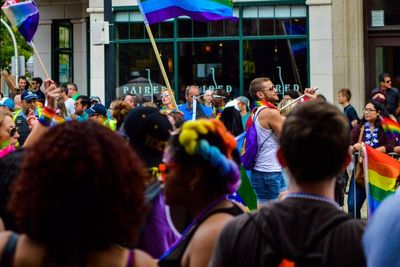The Human Rights Campaign (HRC) in partnership with The Equality Federation, released its annual Municipal Equality Index (MEI) report and the results show that cities in the United States are on an upswing for LGBTQ inclusion. That is great news for travelers who want to support inclusive destinations.
The HRC did extensive research on 506 American cities and ranked them from 1 to 100 points. This year they gave 110 cities a perfect score which is a history-making milestone for the organization and the community. That's up 11 cities since the MEI started this project back in 2012.
“LGBTQ+ people are everywhere—in every city, county, and ZIP code. Throughout its 10-year history, the Municipal Equality Index has been centered on supporting and celebrating the work municipalities do to serve LGBTQ+ people in the places they call home,” said JoDee Winterhof, Human Rights Campaign Senior Vice President of Policy and Political Affairs. “This year, state-wide lawmakers have zeroed in on attacking transgender and non-binary children—for no reason other than in an effort to harm and erase them. Local leaders, however, have continued to move the needle of progress forward, and by doing so, they have spurred economic growth by signaling to residents, visitors, and employers that their city is open to everyone.”
Surprisingly, there were 74 cities nationwide that scored a high score of 85 points despite their respective state's restrictive policies. That means activists, politicians, and allies have succeeded in their determination to undercut staunch leadership views over the last decade by relentlessly fighting for non-discrimination bills, trans rights, and unbiased healthcare.
“In reflecting on the Municipal Equality Index’s 10-year history, it feels as though these past few years have been the most challenging, and yet the most critical, to advancing LGBTQ+ equality. Despite the increasing attacks we are seeing on transgender youth in state legislatures, the important work to advance protections for LGBTQ+ people continues at the local level,” said Fran Hutchins, Executive Director of Equality Federation Institute. “As we face the upcoming attacks by opponents of equality, we know the state-based movement is stronger than ever and ready to fight for the millions of LGBTQ+ Americans who need us in the towns and cities across this country.”
The report also includes ways municipalities can strengthen and support their LGBTQ populations. Additionally, the report includes HRC’s Pledge for Local Elected Leaders to End Violence Against Black and Brown Transgender Women.
“For 10 incredible years, the MEI has helped guide, shape and inspire more inclusive laws and policies in cities of all sizes in all parts of the country,” said Cathryn Oakley, State Legislative Director & Senior Counsel for the Human Rights Campaign and Founding Author of the Municipal Equality Index. “This program is one of the key ways HRC is able to impact the daily lives of our members, supporters and allies. Being able to personally witness these communities continue to push themselves to better serve their LGBTQ+ communities over the years has been one of my greatest joys. I am incredibly proud of this project and of the MEI team who have made this report a vehicle of enduring change and of our partners in communities around the country who have enthusiastically embraced its possibilities.”
Other significant findings from the 2021 MEI include:
- This year, 181 cities have transgender-inclusive healthcare benefits for municipal employees—up from 179 in 2020, despite more rigorous standards this year, and only five at the start of the MEI.
- The national city score average jumped to an all-time high of 67 points, up from 64 last year and 59 in 2012, marking both the fourth consecutive year of national average increases as well as the highest year-over-year national average growth ever.
- As a marker of the change that ten editions of the MEI have brought, cities rated by the MEI in 2012 averaged 59 points then; in 2021, those cities averaged 85 points.
- 11 cities scored 100 points in the 2012 MEI; ten times that number did so in 2021, the tenth edition.
- Cities around the country saw progress, with every region of the country seeing a higher average score than last year.
- 43 municipalities have anti-conversion therapy ordinances in states with no state-level protections, up from 38 last year.
- The tenth edition of the MEI tells a story of sustained, transformational growth in cities of every size in every region of the country. While state legislatures attacked LGBTQ+ people in a historically difficult legislative session, cities focused on solving actual problems.
However, despite the growing numbers, the HRC emphasizes the need to do more. There are many hurdles still to overcome such as employment protections, housing equality, credit, education, public spaces/services, federally funded programs, and jury service. The HRC is a strong supporter of the federal Equality Act which they say if passed, would enact laws protecting the community consistently.
The MEI rated 506 cities including the 50 state capitals, the 200 largest cities in the U.S., the five largest cities or municipalities in each state, the cities home to the state’s two largest public universities, the 75 municipalities that have high proportions of same-sex couples and 98 cities selected by HRC and Equality Federation state group members and supporters.
It assesses each city on 49 criteria covering citywide nondiscrimination protections, policies for municipal employees, city services, law enforcement, and the city’s leadership on LGBTQ+ equality.
The full report, including detailed scorecards for every city, as well as a searchable database, is available online HERE.
- Cracker Barrel makes HRC's Corporate Equality Index - OutVoices ›
- Union Pacific steps up as ally, earns perfect score from HRC ›
